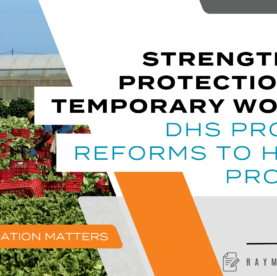UPDATE: President Trump Issues New Travel Ban for Eight Countries, Ends Temporary Protection for Sudanese
The White House has announced its newest executive order on immigration, placing travel bans and restrictions on seven countries in Africa, the Middle East, the Persian Gulf, and Asia. In a separate decision, President Trump ended temporary protection from deportation for Sudanese nationals currently living in the United States.
The travel ban targets the five countries that were included in the original travel ban earlier this year: Libya, Syria, Yemen, Somalia, and Iran. It also adds three countries: Chad, Venezuela, and North Korea, the last of which is likely a response to its current tensions with the United States.
The current executive order differs from the previous travel ban in two key respects: first, for the most part, it is more prospective in scope, largely affecting the issuance of new visas rather than the denial of entry for current visa holders; and second, it lacks any time limitation, a key distinction from the original ban, which lasted only 90 days.
The newest executive order treats each of the listed countries differently. For instance, Syria and North Korea received total bans, eliminating both temporary and permanent visas to the United States. Immigration from Iran is now highly restricted, limited to students and exchange visitors. Permanent and tourist visas were eliminated for Yemen and Libya, although several other temporary visas, such as student and short-term employment visas, were not revoked. Venezuela faces the fewest restrictions, with only members of the Venezuelan government barred from travel to the United States.
Permanent residents of the United States (green card holders) and those with current and valid visas will not have their statuses revoked. Likewise, the order does not affect those already in the United States. Additionally, the ban does not affect people who have been previously granted asylum, classified as a refugee in the United States, or been granted withholding of removal under the laws of the United States or the United Nations Convention Against Torture.
One key feature to this order is its focus on security – nationals of these countries who are still permitted to apply for visas face additional scrutiny when making their applications. Section 1 of the order states that it is the “policy of the United States to protect its citizens from terrorist attacks and other public-safety threats,” and that “[s]creening and vetting protocols and procedures associated with visa adjudications and other immigration processes play a critical role in implementing that policy.” The country-specific policies also emphasize the fact that screening and safety are concerns. For instance, the order states that Libya “faces significant challenges in sharing several types of information, including public-safety and terrorism-related information necessary for the protection of the national security and public safety of the United States,” and that it “has significant inadequacies in its identity-management protocols.”
The executive order’s legal footing is still unknown. The original travel ban received sharp criticism for affecting only Muslim-majority countries, and many believed it established a religious test for entry. University of Virginia Law Professor Saikrishna Prakash has noted, as reported by AOL News, that the “greater the sense that the policy reflects a considered, expert judgment, the less the temptation (by courts) to second-guess the executive.” Will the addition of new countries to the current executive order and its more thorough discussion regarding safety and national security be enough to evoke that sense?
Several experts see this order as no more than a continuation of the Muslim ban. Becca Heller, director of the International Refugee Assistance Project, stated that this “is still a Muslim ban – they simply added three additional countries,” and that of “those countries, Chad is majority Muslim, travel from North Korea is already basically frozen and the restrictions on Venezuela only affect government officials on certain visas.” Anthony D. Romero, Executive Director of the ACLU, added that “”Six of President Trump’s targeted countries are Muslim. The fact that Trump has added North Korea — with few visitors to the US — and a few government officials from Venezuela doesn’t obfuscate the real fact that the administration’s order is still a Muslim ban.” With the latest executive order likely to face one or more legal challenges, the courts will ultimately need to decide its legality and whether it is properly tailored to meet its goal of better national security.
Finally, in a separate decision, President Trump declared that Sudanese nationals currently living in the United States with temporary protected status, or “TPS,” will not have their status extended beyond 2018. TPS was granted to Sudanese nationals following the civil war that has ravaged the region, leading to a split nation and the formation of a new country, South Sudan, in 2011. Sudanese nationals currently holding TPS will either need to change to a new immigration status within the United States or return home. South Sudan, however, will remain as a TPS-designated country until at least 2019.
The NMM Immigration Blog will continue to provide updates as the Administration releases new information on these travel restrictions. If you have questions about this post or other immigration topics, please contact me at wcmenard@nmmlaw.com.




